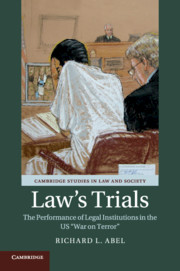Book contents
- Law’s Trials
- Cambridge Studies in Law and Society
- Law’s Trials
- Copyright page
- Contents
- Tables
- Foreword
- Foreword
- Preface
- Acronyms and Abbreviations
- Chapter One Judging the Judges
- Chapter Two Criminal Prosecutions
- Chapter Three Courts-Martial
- Chapter Four Military Commissions
- Chapter Five Habeas Corpus
- Chapter Six Civil Damages Actions
- Chapter Seven Civil Liberties
- Chapter Eight Reversible Error?
- Appendix: Tables
- Notes
- References
- Index
- Cambridge Studies in Law and Society
- References
References
Published online by Cambridge University Press: 06 September 2018
- Law’s Trials
- Cambridge Studies in Law and Society
- Law’s Trials
- Copyright page
- Contents
- Tables
- Foreword
- Foreword
- Preface
- Acronyms and Abbreviations
- Chapter One Judging the Judges
- Chapter Two Criminal Prosecutions
- Chapter Three Courts-Martial
- Chapter Four Military Commissions
- Chapter Five Habeas Corpus
- Chapter Six Civil Damages Actions
- Chapter Seven Civil Liberties
- Chapter Eight Reversible Error?
- Appendix: Tables
- Notes
- References
- Index
- Cambridge Studies in Law and Society
- References
- Type
- Chapter
- Information
- Law's TrialsThe Performance of Legal Institutions in the US 'War on Terror', pp. 807 - 820Publisher: Cambridge University PressPrint publication year: 2018

